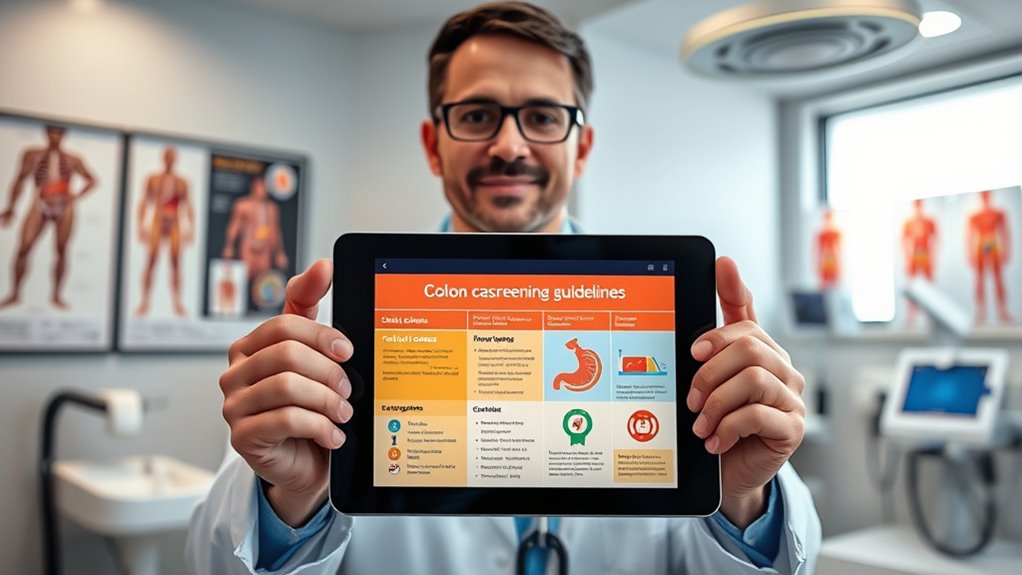To stay proactive about your health, men should start colon cancer screening at age 45, or earlier if you have a family history or other risk factors. The most common method is a colonoscopy, which checks for and removes polyps before they turn into cancer. Non-invasive options like stool tests are also available. Following your healthcare provider’s recommendations is key. Keep going to learn more about how to protect your health and catch issues early.
Key Takeaways
- Men should generally begin colon cancer screening at age 45, earlier if there’s a family history or genetic risk factors.
- Colonoscopy is the primary screening method, typically recommended every 10 years for average-risk individuals.
- Non-invasive tests like FIT or stool DNA are alternative options, with testing frequency varying based on the method.
- Those with a family history or genetic syndromes may need earlier and more frequent screening as advised by healthcare providers.
- Lifestyle changes, such as a healthy diet and regular exercise, complement screening efforts to reduce colon cancer risk.

Colon cancer screening is essential for men to detect the disease early and improve treatment outcomes. Understanding how your genetic risk and lifestyle factors influence your chances of developing colon cancer can help you make informed decisions about screening. If you have a family history of colon cancer or certain genetic conditions, your risk increases considerably. For example, if a close relative was diagnosed at a young age, you might need to start screening earlier or undergo more frequent tests. Genetic factors like Lynch syndrome or familial adenomatous polyposis can dramatically elevate your risk, making regular screening crucial. Knowing your family history and discussing it with your healthcare provider allows you to personalize your screening plan and catch potential problems before symptoms appear.
Your lifestyle also plays an essential role in your risk for colon cancer. Diets high in red and processed meats, low in fiber, and lacking fruits and vegetables can increase your likelihood of developing the disease. Sedentary behavior, obesity, smoking, and heavy alcohol consumption further compound this risk. By making healthier lifestyle choices, you can lower your chances of developing colon cancer. Incorporate more physical activity into your routine, aim for a diet rich in plant-based foods, and avoid smoking and excessive alcohol. These changes not only reduce your risk but also improve your overall health. Additionally, understanding your personal risk factors**** can help tailor your screening schedule more effectively.
Screening guidelines typically recommend that most men begin regular colon cancer screening at age 45. However, if you have a family history or known genetic risk factors, your doctor might advise starting earlier. The most common screening tests include colonoscopy, which allows for direct examination and removal of polyps, and non-invasive stool tests like fecal immunochemical tests (FIT) or multitarget stool DNA tests. Your doctor will help determine the best approach based on your individual risk factors and preferences. Regular screening is essential because it helps detect precancerous polyps and early-stage cancers when they’re most treatable. Even if you feel healthy, these tests are necessary for early detection, especially if you have genetic predispositions or lifestyle habits that increase your risk.
Ultimately, understanding how genetic risk and lifestyle factors impact your colon cancer risk empowers you to take proactive steps. Follow your healthcare provider’s screening recommendations and adopt healthier habits to protect your health. Early detection saves lives, and being informed about your personal risk factors puts you in control of your health journey.
Frequently Asked Questions
Are There Genetic Factors That Influence Screening Recommendations?
Yes, genetic factors influence your screening recommendations. If you have genetic predispositions or hereditary syndromes like Lynch syndrome or familial adenomatous polyposis, your doctor might suggest starting screenings earlier or undergoing more frequent tests. These hereditary conditions increase your risk of colon cancer, so knowing your family history and genetic background helps tailor your screening plan to catch potential issues early and improve your health outcomes.
How Does Diet Impact Colon Cancer Risk in Men?
Think of your diet as your secret weapon—eating more fiber and cutting back on red meat can lower your colon cancer risk. Just like a knight on a quest, fueling your body with high-fiber foods helps keep your digestive system strong, while reducing red meat intake minimizes harmful carcinogens. By making these simple changes, you’re actively protecting yourself and improving your long-term health, much like upgrading your armor in a game.
Can Lifestyle Changes Reduce the Need for Screening?
Lifestyle modifications can considerably reduce your risk of colon cancer, potentially lowering the frequency or necessity of screening. By adopting healthy habits like regular exercise, a balanced diet, quitting smoking, and limiting alcohol, you support your colon health. These changes can complement screening efforts, but they don’t eliminate the need for routine screenings. Always consult your healthcare provider to determine the best screening plan based on your personal risk factors.
What Are the Signs of Early Colon Cancer Symptoms?
Early colon cancer symptoms can be subtle, so staying aware of signs is vital for early detection. You might notice changes in bowel habits, such as diarrhea or constipation, or find blood in your stool. Fatigue, unexplained weight loss, and abdominal discomfort are also common. By being symptom-aware, you can seek medical advice promptly, improving your chances for early detection and successful treatment. Regular screening remains essential, especially if you’re at higher risk.
Is Screening Effective for Men With a Family History?
Yes, screening is highly effective if you have a family history of colon cancer. Your genetic predisposition increases your risk, so regular screenings help catch issues early. Dietary influence also plays a role, so adopting a healthy diet can further reduce your risk. By staying vigilant with screening, you improve your chances of early detection and successful treatment, especially given your increased vulnerability due to family history.
Conclusion
Sticking to the screening guidelines can truly save your life. Did you know that regular colon cancer screenings reduce your risk of death by up to 60%? By starting screenings at age 45 and staying consistent, you catch problems early when they’re most treatable. Don’t wait until symptoms appear—taking action now could make all the difference. Prioritize your health today, and stay ahead of colon cancer with regular screenings.









